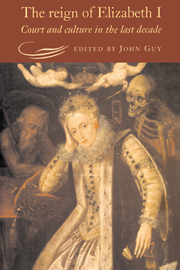Book contents
- Frontmatter
- Contents
- List of figures
- Preface
- List of contributors
- List of abbreviations
- Introduction The 1590s: the second reign of Elizabeth I?
- 1 The patronage of the crown in Elizabethan politics: the 1590s in perspective
- 2 Regnum Cecilianum? A Cecilian perspective of the Court
- 3 Patronage at Court, faction and the earl of Essex
- 4 Peers, patronage and the politics of history
- 5 The fall of Sir John Perrot
- 6 The Elizabethan establishment and the ecclesiastical polity
- 7 Ecclesiastical vitriol: religious satire in the 1590s and the invention of puritanism
- 8 Ecclesiastical vitriol: the kirk, the puritans and the future king of England
- 9 Social strain and social dislocation, 1585–1603
- 10 Lord of Liberty: Francis Davison and the cult of Elizabeth
- 11 The complaint of poetry for the death of liberality: the decline of literary patronage in the 1590s
- 12 Summer's Last Will and Testament: revels' end
- 13 The theatre and the Court in the 1590s
- Index
4 - Peers, patronage and the politics of history
Published online by Cambridge University Press: 06 January 2010
- Frontmatter
- Contents
- List of figures
- Preface
- List of contributors
- List of abbreviations
- Introduction The 1590s: the second reign of Elizabeth I?
- 1 The patronage of the crown in Elizabethan politics: the 1590s in perspective
- 2 Regnum Cecilianum? A Cecilian perspective of the Court
- 3 Patronage at Court, faction and the earl of Essex
- 4 Peers, patronage and the politics of history
- 5 The fall of Sir John Perrot
- 6 The Elizabethan establishment and the ecclesiastical polity
- 7 Ecclesiastical vitriol: religious satire in the 1590s and the invention of puritanism
- 8 Ecclesiastical vitriol: the kirk, the puritans and the future king of England
- 9 Social strain and social dislocation, 1585–1603
- 10 Lord of Liberty: Francis Davison and the cult of Elizabeth
- 11 The complaint of poetry for the death of liberality: the decline of literary patronage in the 1590s
- 12 Summer's Last Will and Testament: revels' end
- 13 The theatre and the Court in the 1590s
- Index
Summary
The earl had sought political power throughout the last decade of Elizabeth's reign. A soldier, a courtier, a patron of the arts and sciences, he lived on a grand scale and spent sumptuously. As the era drew to a close he moved to secure his own hold on power by marshalling his followers and counselling James VI of Scotland. To the Scottish king he expressed the peers' discontent with Elizabeth's policies:
The nobility are unsatisfied that places of honour are not given them … that offices of trust are not laid in their hands to manage as they were wont; that her majesty is parsimonious and slow to relief their wants … They repine that the state value them not at that rate they prise themselves worthy of.
The earl challenged the power of Robert Cecil, became a leading political patron himself and, indeed, demanded to oversee royal patronage. In the end, he fell in a plot against his sovereign
While such a story might suggest only one man, Elizabeth's favourite, Robert Devereux, earl of Essex, it actually chronicles his brother-in-law Henry Percy, ninth earl of Northumberland. Scion of the northern earls who were long keepers of the borders between England and Scotland, Percy's story is not as well known as that of the earl of Essex. Yet Northumberland's complaints to King James vividly display demands for political power and patronage by members of the Elizabethan nobility that went unanswered in the last years of Queen Elizabeth's reign.
- Type
- Chapter
- Information
- The Reign of Elizabeth ICourt and Culture in the Last Decade, pp. 87 - 108Publisher: Cambridge University PressPrint publication year: 1995
- 16
- Cited by



